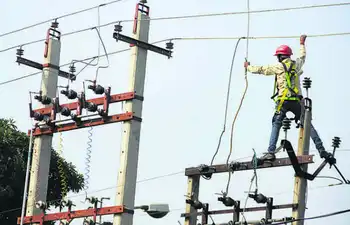Duke Energy Sells 8 Power Plants in $475 Million Deal
By The Charlotte Observer, N.C.
CSA Z462 Arc Flash Training - Electrical Safety Essentials
Our customized live online or in‑person group training can be delivered to your staff at your location.

- Live Online
- 6 hours Instructor-led
- Group Training Available
Duke considered the eight natural-gas fired plants worth at least $1.4 billion more than the negotiated price before it put them up for sale in January.
Lackluster bids forced Duke to write down the value of the plants three times. The plants are among the weakest performers in Duke's weakest division.
Selling the power plants -- all outside Duke Power's service area -- is an integral piece of the Charlotte-based company's turnaround plan. The company is returning to its more conservative roots and moving away from the once high-flying wholesale energy business, which has been decimated by too much available power chasing too few customers.
Total proceeds from the planned sale, including about $500 million in tax benefits, will be about $1 billion.
It also pushes Duke significantly over its goal for the year of $1.5 billion in asset sales. When the deal is final, expected to be this fall, total asset sales will be about $2.5 billion.
KGen Partners is owned by New York-based MatlinPatterson Global Opportunities II. The private equity firm doesn't disclose its financials.
MatlinPatterson Chairman Mark Patterson declined to elaborate on why his firm was interested in the eight plants or his plans for them.
Securities filings show the firm or its principals have holdings in MCI Inc. and NRG Energy Inc. The firm has a history of buying the debt of bankrupt companies.
Duke built its portfolio of southeastern plants in the late '90s and 2000, to sell wholesale power to big industrial users and local utilities.
At the time, prospects looked bright for the wholesale plants: They ran on natural gas, which was cheap. They would feed a growing economy's thirst for power. They would take advantage of new rules proposed by the federal government that would make it easier to move power from a Southeastern plant to neighboring states.
But each of those assumptions proved wrong: Natural gas prices spiked; the economy faltered and dampened power demand; and the proposed rules ran into a roadblock of Southeastern regulators who didn't want their residents paying for improvements that would mostly benefit out-of-staters.
Some of Duke's eight wholesale plants in the region haven't been running at all recently, finding it hard to compete against lower- cost coal and nuclear plants.
The final $475 million price tag for the eight plants was lower than what Duke thought it would get, even after twice realizing the plants would fetch less on the market and recording those writedowns in its books. To reflect that, Duke will amend its first-quarter earnings with an additional $36 million loss.
Financial entities, rather than utilities, were bigger bidders for Duke's eight plants, executives have said.
Those financial institutions are more willing to wait the five to 10 years necessary for the market to pick up, Duke Chief Executive Officer and Chairman Paul Anderson has said.
But utilities, under pressure from credit rating agencies, feel the need to cut debt now and don't feel they have the luxury to wait.
Duke says it's on schedule to cut its goal of $3.5 billion to $4 billion of debt this year.
Duke is holding onto wholesale plants in California, the Northeast and Latin America, which provide more reliable profits.











